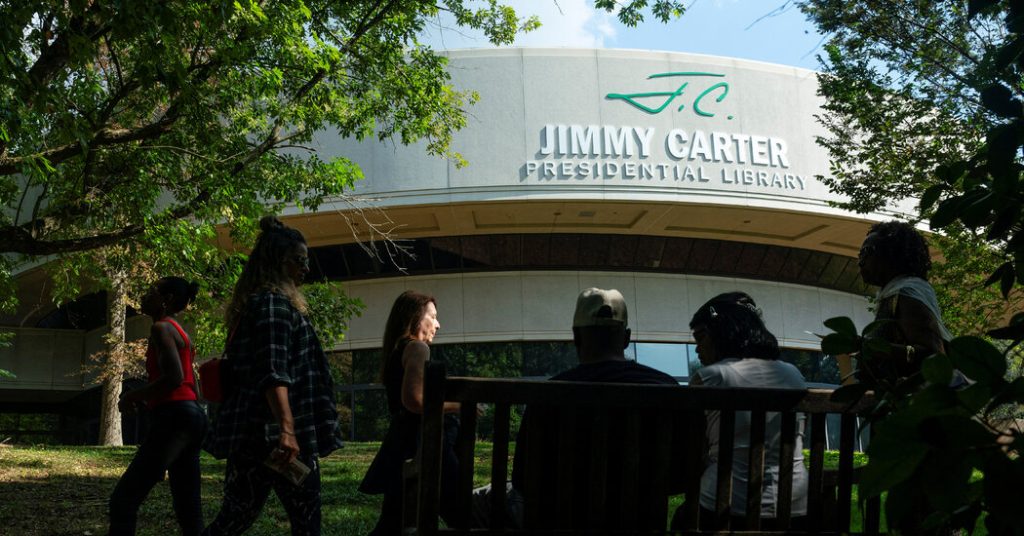Sudden Cancellation of Book Events at the Jimmy Carter Presidential Library Sparks Concern
Three book events at the Jimmy Carter Presidential Library and Museum in Atlanta were abruptly canceled this week, raising questions about the impact of recent leadership changes at the National Archives and Records Administration (NARA) on programming at the 13 presidential libraries it oversees. The events, which featured authors discussing books on climate change, homelessness, and the civil rights movement, had been scheduled months in advance. However, the authors were recently informed that their events would need to be moved to other venues, and all related information was removed from the library’s website. Among the affected authors was Elaine Weiss, whose new book, Spell Freedom: The Underground Schools that Built the Civil Rights Movement, explores the role of the Highlander Folk School in organizing “citizenship schools” during the Jim Crow era to help Black southerners pass literacy tests and gain voting rights. Weiss described the cancellation as “chilling” and expressed concern about the implications of requiring Washington approval for programming about democracy and voting rights.
The Broader Context: Leadership Changes and Turmoil at the National Archives
The cancellations at the Carter Library come amid broader turmoil at NARA, the federal agency overseeing the presidential libraries. President Trump has been reshaping the federal government through budget cuts and personnel changes, and his actions have directly impacted NARA. On February 7, Trump abruptly fired Colleen J. Shogan, the national archivist appointed by President Biden, and named Secretary of State Marco Rubio as acting archivist. Additionally, Trump announced that Jim Byron, CEO of the Richard Nixon Foundation, would manage the archives on a day-to-day basis until a permanent replacement is named. These changes have raised concerns about the politicization of NARA and its mission to preserve and make accessible the nation’s historical records. The sudden closure of the John F. Kennedy Library and Museum in Boston earlier this month, reportedly due to staff cuts demanded by Elon Musk’s Department of Government Efficiency, further highlights the challenges facing presidential libraries under the current administration.
The Impact on Authors and the Public
The cancellation of the events at the Carter Library has left authors and publishers scrambling to find new venues. Elaine Weiss’s event, for example, will now take place at the Georgia Center for the Book, a private nonprofit affiliated with the Library of Congress. Weiss expressed disappointment and irony over the situation, given the Carter Library’s mission to honor a president known for his commitment to democracy. “We are being told that we all have to tell ‘patriotic’ stories about American history,” she said. “To me, this is the most patriotic story imaginable.” Other authors affected by the cancellations include Mike Tidwell, whose book The Lost Trees of Willow Avenue explores climate change, and Brian Goldstone, whose book There Is No Place for Us examines homelessness in Atlanta. Goldstone’s publisher, Crown, confirmed that the cancellation was due to the library’s new requirement to seek approval from NARA for all programming, even for events already scheduled.
The Role of Presidential Libraries in Preserving History and Promoting Dialogue
Presidential libraries are not just repositories of historical records but also spaces for public engagement and dialogue. They host events, exhibitions, and programs that reflect the legacy of the presidents they honor and address contemporary issues. The Carter Library, in particular, has a long tradition of promoting democratic values and social justice, reflecting Jimmy Carter’s commitment to these principles. The cancellation of events focused on civil rights, climate change, and homelessness raises questions about whether this shift in programming reflects a broader effort to align library activities with the current administration’s priorities. While NARA’s press office stated that leadership at each presidential library is empowered to make its own programming decisions, the sudden requirement for Washington approval suggests a potential centralization of control over content.
Unanswered Questions and the Future of Presidential Libraries
Despite multiple inquiries, officials at the Carter Library and NARA have not provided clear explanations for the cancellations or the new approval process. This lack of transparency has fueled speculation about the motivations behind these decisions and their implications for the independence of presidential libraries. The abrupt firing of the national archivist and the involvement of political figures in managing NARA have further raised concerns about the politicization of these institutions. As the nation looks to its presidential libraries to preserve history and promote public understanding, the recent events at the Carter Library serve as a reminder of the fragility of these institutions in times of political turmoil.
A Call for Transparency and Accountability
The cancellation of the book events at the Carter Library underscores the importance of transparency and accountability in the management of presidential libraries. These institutions are entrusted with preserving the nation’s history and fostering public engagement, and any decisions that impact their programming should be made with careful consideration of their mission. The sudden shift in policy at the Carter Library, coupled with the broader changes at NARA, raises important questions about the role of politics in shaping the work of these libraries. As the situation continues to unfold, advocates for democracy, education, and the arts are calling for greater clarity and assurance that these institutions will remain committed to their core values of preserving history and promoting dialogue.


